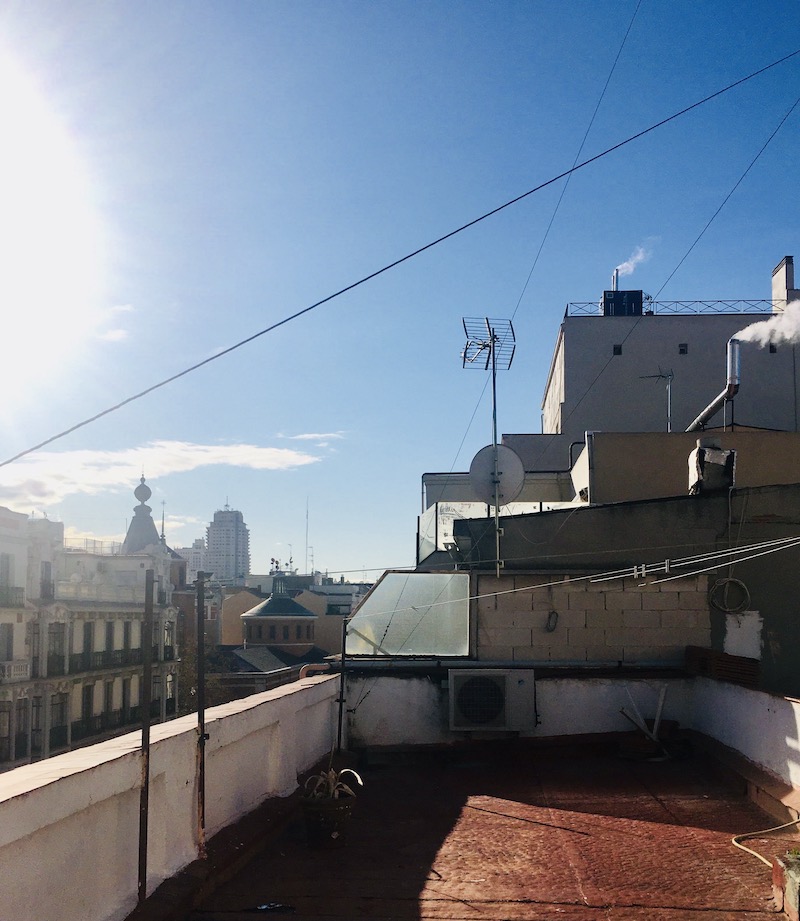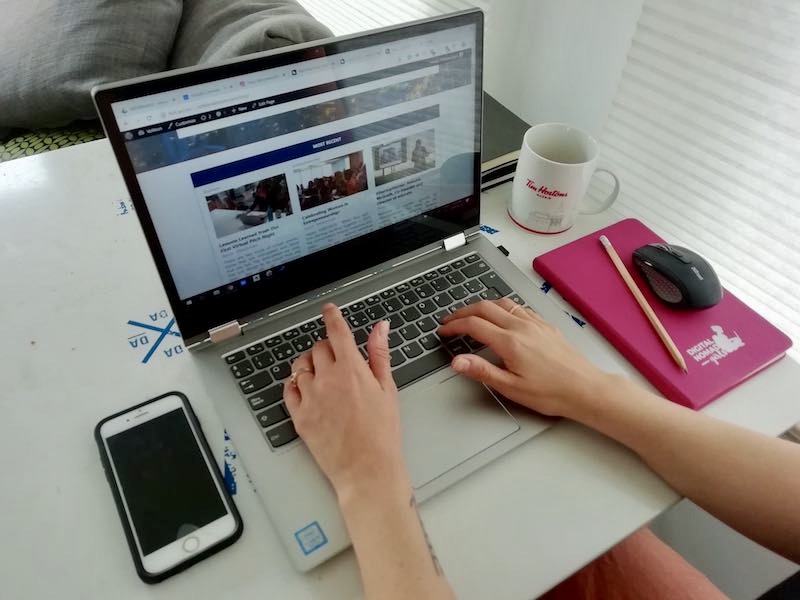Lockdown diaries: Melanie, international advisor and co-founder of Volition
As an owner of a small business working with other small businesses, it’s been 24/7 crisis management and creative ideation mode, while also transitioning to working in a shared space and making sure to take care of my health. It’s been quite a learning experience!
From journaling every morning to actually turning FaceTime off at times, Melanie shares ways she’s learned how to cope with the drastic life changes most of us are experiencing right now, as well as how we can help those in need. And her message to her hometown of Vancouver: please lock it down!
Melanie Ewan is originally from Canada and has been living in Madrid since November 2018. She’s a Co-founder and Managing Partner of Volition, an international advisory firm that works with startups and entrepreneurs. She’s also Lead Researcher for Women in Tech World, a Canadian nonprofit dedicated to supporting and advancing women in tech.
What was your life like just before the lockdown vs. today?
While I have worked 100% remote for almost two years now, my company, business partner, and our team are all based in Western Canada, and while I often work with clients remotely and launched a virtual masterclass in January, most of our services and events are held in person. In fact, I had a Women’s Pitch Night Madrid booked at Google for Startups Campus on March 11th, right when things were starting to ramp up here in Madrid.
There are two main ways in which my life has shifted since the lockdown (and even right before). Firstly, I am now sharing my workspace with my husband, who is working remotely for the first time in his life. More on that later… But secondly, there has been a major shift in my work life.
How has the lockdown impacted your industry and work life?
Given that we work with entrepreneurs and small businesses, mostly in-person, COVID-19 has added this extra layer of work and anxiety that permeates my workday. While we have been shifting and pivoting quickly over the past two weeks, today I finally sat down and drew out our response plan, including everything from stating who we want to be as a business during this time and what we want to bring to the community, to how I can support my team at this time.
The first thing for us to address was moving all services and events virtual, and how to communicate this to our communities across Canada and Europe. We had never held our signature event, our Pitch Nights, virtually, so this created a steep learning curve for the entire team. The next step has been to figure out our longer-term communications plan and how we can adapt and mitigate the effects of COVID-19 both for our business and the businesses that we work with and support.
I do feel incredibly fortunate to still have work at this time – many in my life no longer do. That said, as an owner of a small business working with other small businesses, it’s been 24/7 crisis management and creative ideation mode, while also transitioning to working in a shared space and making sure to take care of my health. It’s been quite a learning experience!
What does the street look like?
To be honest, the neighbourhood that I live in, Moncloa, is always pretty quiet relative to most other areas of Madrid. The most noticeable difference is that everyone is walking around solo with a distinct air of quiet determination – they are on a mission to get to and from somewhere as quickly as possible. And there are no kids, no random bursts of childish laughter or chatter from students on their way home from school. All you see are adults and dogs.
Have you noticed any acts of kindness or uplifting things recently?

As I’m sure others have mentioned, the 8pm balcony applause is always incredibly heartwarming – it makes you feel like you’re a part of something, that you’re a little less alone in all of this.
Also, our rooftop area – which we can see from our window – has been the scene of a few uplifting moments, such as an elderly couple using the space to get in their steps for the day, or a family setting up chairs to be entertained by their kids, who had seemingly concocted a mini dance show for the occasion.
How are you coping?
COVID-19 has made my life 10x busier, so for me, that has meant being more intentional than usual about my wellness routine (10-30 mins of yoga using an app, journalling, and 10 mins of reading). The journal prompts that have helped me include: what am I feeling, what do I want to feel, what I can control, what I can’t control, and my intention for the day.
As an introvert, carving out alone and quiet time has also been important this week, which seems funny to say during a lockdown. Thing is, in addition to sharing the home space 24/7, my phone has been buzzing continuously, and with daily meetings and virtual events throughout the week, by day 7 of lockdown I was so tired from ‘facetime’ that I canceled as much as possible, stayed off the news, and curled up in bed by 8:30pm.
Whether you’re an introvert or not, I highly recommend carving out personal time in your schedule – a time where you do something just for you, without guilt or judgment.
Who are you in quarantine with? Any advice for people in your similar situation?

On the topic of sharing space, while I can’t imagine what it must be like to be a caregiver at this time, I can provide some insights on the couple’s front. The moment we knew that we would have to share the space (barely a 1 bedroom flat), we sat down and compared our daily schedule. We revisited our habits and needs for space, times we were likely to have meetings, and how to work with our very different eating schedules. It took compromises on both sides and a commitment to respecting each others’ space and not being offended by the need for alone time.
We agreed on some ground rules, and have also talked through how we can support and motivate each other in ways that we need. Each day we talk about what each of us wants to achieve that day and what our schedule looks like. We also have a food plan in place so that we don’t have to think much about that – on the food front I admit I am super lucky as my husband loves to cook and food, tea, and wine just magically appear by my side 2-3 times a day. I had to adjust my eating schedule for this, but was more than happy to make the “sacrifice”!
The key thing for us was to lean into our individual strengths and then just communicate, communicate, communicate. Earplugs and random dance parties have also helped.
What’s the first thing you’ll do once the lockdown is over?
Go out for food. Even though we don’t eat out that often, we have already been dreaming about our favourite restaurants and just lounging on a terrace in the sun, wine glass in hand. I have a list of all of the places that I want to visit as soon as we can, and I’m also foreseeing lots of picnics.
If you could tell the government one thing right now, what would it be?
That’s a good question. When everything first started happening I really struggled to find resources in English that clearly captured what was going on in Spain and what the government was recommending. While I have been learning Spanish, it’s not up to snuff for situations like this, so this gap caused some anxiety for me. Even now my main source of information is El País English (Twitter account). Thankfully, I have good friends here who have sent me the most urgent news, and Google Translate for Twitter is fantastic.
I know that offering translations of official announcements, updates and recommendations is not at the top of the priority list, but it is important to ensure that all those in your country are informed. I also know that this has been an issue in many countries – my home country of Canada was just called out for not providing sign language translations of urgent announcements. Just something to consider to ensure that urgent communications are accessible for all.
Have there been any comical moments in this unprecedented time?
Of course! These days I seek out moments of laughter, and my partner often has The Tonight Show: At Home Edition or Trevor Noah at Home on during our lunch break. My favourite comical moments are the random things that we end up doing in our daily life. For instance, recently I started hopping around the kitchen (because, why not) and Tom decided to start copying my every move…it turned into a ridiculous game that took up a good 5 minutes, got us some exercise, and left us in a pile of giggles. It made no sense, but that was the beauty of it.
Do you have any tips for how we can help those in need?
There are so many ways! First off, ask what you can do to help – ask your community, ask your friends and family, and truly listen to what they say. If you can’t directly help, often someone in your network can.
I recently reached out to my community to see what they needed help with, and learned that what many need most is access to a support network and resources to overcome unexpected burdens – financial, childcare, mental health. Here is one resource I wrote up to give back to my community (Canadian startups and entrepreneurs).
You can also help small businesses and brands by showcasing them on your socials and blog, buying gift cards, providing opportunities to continue to network and learn, and giving them reviews and testimonials.
There are so many other ways to help those in need. I am very aware of those who are being locked in with abusive partners, for instance, as well as those who are struggling with their mental health at this time. Research and share local resources for these people, and check in with everyone in your network.
What’s going on in your hometown and would you like to send them a message?
Honestly, now that we’re in lockdown here in Madrid, my daily dose of anxiety comes from my hometown of Vancouver. I worry for my friends and family as they aren’t yet in lockdown and many residents aren’t taking social distancing seriously.
My message is for the provincial and municipal governments – please lock it down! And make sure that support is in place and accessible for those who are in difficult situations with their work – if both parents are ‘essential service workers’, find a way to ensure childcare is readily available so that grandparents aren’t taking on that burden. Make it easy for employers and employees to make health a priority. Learn from others’ mistakes!
You can connect with Melanie Ewin on LinkedIn & Twitter
Check out all Madrid lockdown stories
If you’d like to get involved and share a compelling story from this ongoing chapter of history, reach out to Daphne Binioris (daphne@veracontent.com) and Daniel Catalan (a96039@aup.edu)